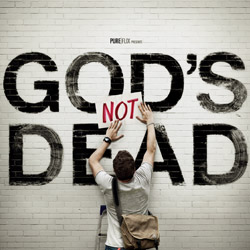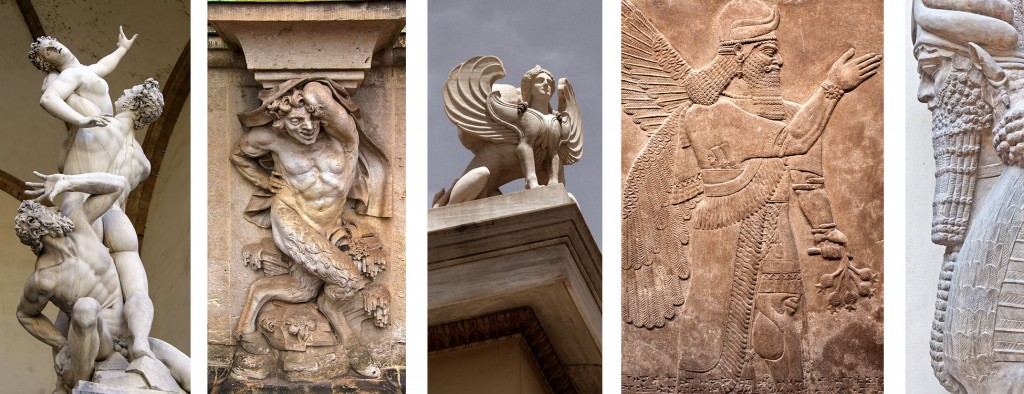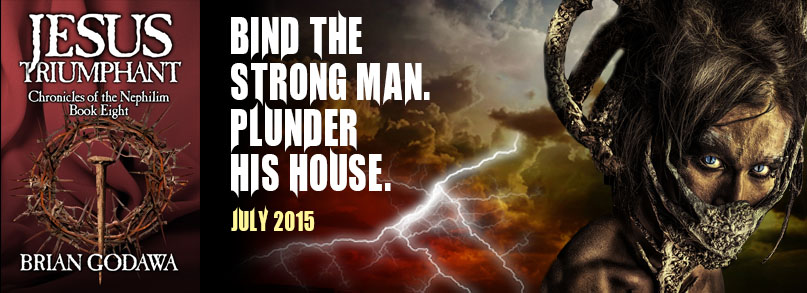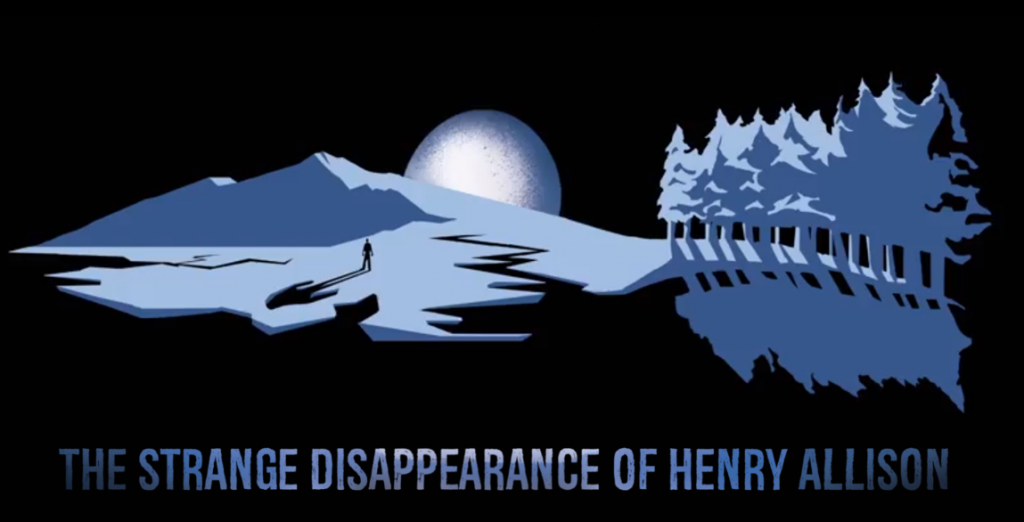
Chronicles of the Nephilim has largely been based upon the Divine Council worldview that has been explained in many free articles on the Chronicles Links Page and my book When Giants Were Upon the Earth. This involves the fallen Watchers from God’s heavenly host who are called the Sons of God. They led the world astray in the Days of Noah, that led to the Flood as Yahweh’s judgment. Deuteronomy 32:8-9, then speaks of how at the Tower of Babel, Yahweh divided the seventy nations according to the number of the fallen Sons of God and placed them under their authority. They became the “princes” (Dan. 10:13, 20-21) or “gods” of those pagan nations (Deut. 32:17; 4:19-21), rulers of those geographical territories.[1]
So the headline was a trick, ya see, because Satan isn’t in hell, he’s in the heavens (Eph 2:2).
When earthly rulers battle on earth, the Bible describes the host of heaven battling with them in spiritual unity. In Daniel 10, hostilities between Greece and Persia is accompanied by the battle of heavenly Watchers over those Gentile nations (described as “princes”).
Daniel 10:13, 20
The prince of the kingdom of Persia withstood me twenty-one days, but Michael, one of the chief princes, came to help me, for I was left there with the kings of Persia.” …Then he said, “Do you know why I have come to you? But now I will return to fight against the prince of Persia; and when I go out, behold, the prince of Greece will come.
When Sisera fought with Israel, the earthly kings and heavenly authorities (host of heaven) are described interchangeably in unity.[2] (previous posts showed that in the Bible, “host of heaven” and “stars” are used to mean both the stars we see in the sky and the gods of the nations, interchangeably Deut. 32:43; 4:19; ; Isa 14:12-13)
Judges 5:19–20
“The kings came, they fought; then fought the kings of Canaan…From heaven the stars fought, from their courses they fought against Sisera.
When God punishes earthly rulers, he punishes them along with the heavenly rulers (“host of heaven”) above and behind them.
Isaiah 24:21–22
On that day the Lord will punish the host of heaven, in heaven, and the kings of the earth, on the earth. They will be gathered together as prisoners in a pit; they will be shut up in a prison, and after many days they will be punished.[3]
Though this notion of territorial archons or spiritual rulers is Biblical and carries over into intertestamental literature such as the Book of Enoch (1 En. 89:59, 62-63; 67) and others,[4] it seems to lessen at the time of the New Testament.
 The New Testament epistles speak of the spiritual principalities and powers that are behind the earthly rulers and powers to be sure (Eph. 6:12-13), but it appears to be more generic in reference. And after the death, resurrection, and ascension of Christ, these spiritual powers have been disarmed and overthrown (Col. 2:15, Luke 10:18), at least legally losing their hegemony (Eph. 1:20-23).
The New Testament epistles speak of the spiritual principalities and powers that are behind the earthly rulers and powers to be sure (Eph. 6:12-13), but it appears to be more generic in reference. And after the death, resurrection, and ascension of Christ, these spiritual powers have been disarmed and overthrown (Col. 2:15, Luke 10:18), at least legally losing their hegemony (Eph. 1:20-23).
The fallen angelic powers are still around in the first century, but have been defanged with the inauguration of the Messianic kingdom of God.
But there is one of those fallen angelic powers that seems to rise up and grab extraordinary power in the New Testament: The satan (which translated, means, “Accuser”). The Accuser’s choice of Belial as a proper name in Jesus Triumphant is well-attested in Scripture and other ancient Jewish writings, especially the Dead Sea Scrolls from Qumran.[6] He is also called Beliar, Mastema, and Sammael in other Second Temple literature.[7] (For more details on the satan in the Old Testament, see my book When Giants Were Upon the Earth)
Throughout the Old Testament, the Hebrew word belial is used as a personification of death, wickedness, and treachery, as well as “an emotive term to describe individuals or groups who commit the most heinous crimes against the Israelite religious or social order, as well as their acts.”[8] (For more details on the satan in the Old Testament, see my book When Giants Were Upon the Earth)
The Apostle Paul uses the proper name of Belial for the satan (using language similar to the Dead Sea Scrolls) in 2 Corinthians 6:14–15: “Do not be unequally yoked with unbelievers. For what partnership has righteousness with lawlessness? Or what fellowship has light with darkness? What accord has Christ with Belial?”
Three times in the Gospel of John, this Accuser, Belial, is called “the ruler of this world” (Jn. 12:31, 14:30-31, 16:11), in 2 Cor. 4:4, “the god of this world.” In Eph. 2:2 he is called the “prince of the power of the air, the spirit that is now working in the sons of disobedience.” In fact, when Jesus was tempted by the satan in the desert, he offered Christ all the kingdoms of the world for his own “domain and glory; for it has been handed over to me, and I give it to whomever I wish” (Luke 4:6).
It seems as if the satan is the only Watcher god in authority over the nations, like he has all the power. What happened to all the other ones?
Walter Wink points out a possible key to the solution. In the intertestamental period,
“Much tradition identified Satan as the angel of Rome, thus adapting the angels-of-the-nations idea to the situation of Roman world-hegemony. Since Rome had conquered the entire Mediterranean region and much else besides, its angel-prince had become lord of all other angel-princes of the vanquished nations.This identification was already explicit at Qumran, where Rome and the Romans (the ‘Kittim’ of the War Scroll) are made the specific allies and agents of Satan and his host.”[9]
The Dead Sea Scroll 11QMelch interprets Psalm 82 as describing Satan/Belial as the chief of the gods in the divine council to be punished for his unjust authority over the nations.[10]
Another Jewish intertestamental document, the Testament of the Twelve Patriarchs, lists in several places Beliar, synonymous with Satan, as holding captive mankind.[11]
In 3 Enoch 26:12 Sammael is called the Prince of Rome, just as Dubbiel is called the Prince of Persia (remember the “Prince of Persia” from Daniel 10?).
Just like the satan in the New Testament, Sammael is called the “prince of the accusers who is greater than all the princes of kingdoms that are in the height [heaven]” (3 Enoch 14:2). And just like the satan in the New Testament, Sammael’s name means “god of the blind” (2 Cor. 4:4).[14]
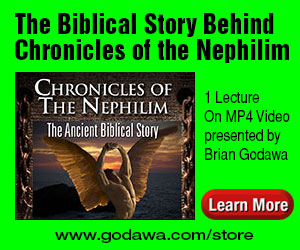 But what about this notion of the ruler (archon), or god of this world? Is the world something bigger than the realm of this satanic Prince of Rome? To answer that, we will have to look at the idea of the world as presented in the New Testament.
But what about this notion of the ruler (archon), or god of this world? Is the world something bigger than the realm of this satanic Prince of Rome? To answer that, we will have to look at the idea of the world as presented in the New Testament.
It is common in the Bible to refer to the Roman Empire as “all the world” (oikoumene) which meant the known inhabited world under Rome’s power (Luke 2:1; Col. 1:6; Rom. 1:8). All the known nations were encompassed in its power and worldview, so it seems those national angelic entities over those nations would therefore also be under the authority of the Watcher of Rome.
If Belial, the satan therefore was “god” or “ruler” of that “world,” then most likely he had become the angelic authority over Rome, and it would make sense that the New Testament would focus on the satan over the other Watchers.
In this understanding, When Jesus the Messiah arrives and inaugurates the kingdom of God, he does so by “binding the strong man” the “god of this world,” the satan. His casting out of demons was a herald of casting down the satan’s power (John 12:31; Matt. 12:28-29), and taking authority over his world. It was as if one fell swoop of the highest heavenly power over the nations brought down all the enemies with him. Jesus destroyed the devil who had the power of death (Heb 2:14).
Then why was the satan still around? He still prowled around like a roaring lion seeking whom he may devour (1Pet. 5:8). His binding was for something very particular. We will examine this “binding” in the next post.
For additional Biblical and historical research related to this post, go to www.ChroniclesoftheNephilim.com under the menu listing, “Links” > Jesus Triumphant.
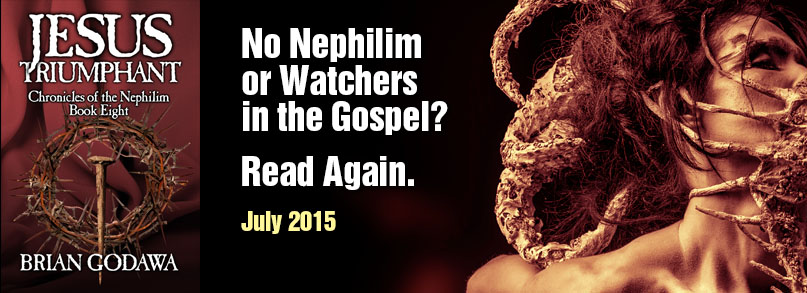
[1] See Appendix, “Sons of God,” in Brian Godawa,
Noah Primeval (Los Angeles: Embedded Pictures, 2011, 2012), 280-289.
[2] See also 2 Kings 6:15-17 where Elisha’s servant has his spiritual eyes opened to see the myriad of heavenly warriors surrounding Israel preparing to battle Syria.
[3] Interestingly, this passage of Isaiah is not clear about what judgment in history it is referring to. But the language earlier in the text is similar to the Flood when it says, “For the windows of heaven are opened, and the foundations of the earth tremble. 19 The earth is utterly broken, the earth is split apart, the earth is violently shaken. 20 The earth staggers like a drunken man; it sways like a hut; its transgression lies heavy upon it, and it falls, and will not rise again.” So this may be another passage that uses a Flood reference tied in with the Watchers and their punishment.
[4] See also Jubilees 15:31-32; Targum Jonathan Deut. 32, Sect. LIII; 3Enoch 48C:9, DSS War Scroll 1Q33 Col. xvii:7, Targum Jonathan, Genesis 11, Section II.
[6] Especially in the War Scroll (1QM) and the Thankgiving Scroll (1QH). Florentino Garcı́a Martı́nez and Eibert J. C. Tigchelaar, “The Dead Sea Scrolls Study Edition (translations)” (Leiden; New York: Brill, 1997–1998), 113-178.
[7] C. Breytenbach (I, IV) and (I–III) Day P. L., “Satan,” ed. Karel van der Toorn, Bob Becking, and Pieter W. van der Horst,
Dictionary of Deities and Demons in the Bible (Leiden; Boston; Köln; Grand Rapids, MI; Cambridge: Brill; Eerdmans, 1999), 72; S. D. Sperling, “Belial,”
DDD, 169; J. W. van Henten, “Mastemah,”
DDD, 553. On Sammael: M. A. Knibb, “Martyrdom and Ascension of Isaiah: A New Translation and Introduction,” in
The Old Testament Pseudepigrapha and the New Testament: Expansions of the “Old Testament” and Legends, Wisdom, and Philosophical Literature, Prayers, Psalms and Odes, Fragments of Lost Judeo-Hellenistic Works, vol. 2 (New Haven; London: Yale University Press, 1985), 151.
[8] S. D. Sperling, “Belial,” ed. Karel van der Toorn, Bob Becking, and Pieter W. van der Horst,
Dictionary of Deities and Demons in the Bible (Leiden; Boston; Köln; Grand Rapids, MI; Cambridge: Brill; Eerdmans, 1999), 169. “Such crimes include: inciting one’s fellows to worship foreign gods (Deut 13:14); perjury (1 Kgs 21:10, 13; Prov 19:28); breach of hospitality (Judg 19:22; 1 Sam 25:17); lese-majesty (1 Sam 10:27); usurpation (2 Sam 16:7–8; 20:1); abuse of Yahweh’s sanctuary by female drunkenness (1 Sam 1:13–17); and the cultic misappropriation and sexual harassment of women by priests (1 Sam 2:12–22). Refusal to lend money on the eve of the Sabbatical year (Deut 15:9) falls into the category of heinous deeds because it indicates lack of faith in the divine ability to provide.” See also, Deut 13:13; Judg 19:22; 1 Sam 1:16; 2:12; 10:27; 25:17; 2 Sam 16:7; Nah 1:15 (2:1); 1 Kgs 21:13.
[9] Wink,
Naming the Powers, Kindle Locations 409-412. Of the Qumran War Scroll, Davies says, “Using the term “Kittim,” which in the Hebrew Bible is applied to Greeks and then (in Daniel) to Romans, it transparently identifies the Roman Empire as the ally of Belial, the spirit/angel of darkness, and of the “Children of Darkness,” and describes their defeat in a great seven-stage battle… At present, there is little consensus on the literary history, though a date in the last quarter of the first century B.C.E. is widely accepted, as is the identification of the Kittim, allies of the “Children of Darkness,” as the Romans.” Phillip Davies, “The Biblical and Qumranic Concept of War,” James H. Charlesworth, Ed.
The Bible and the Dead Sea Scrolls Volume One – Scripture and the Scrolls (Waco: Baylor University, 2006), 223, 226.
[10] 11QMelch (1st century B.C.) Geza Vermes,
The Dead Sea Scrolls in English, Revised and extended 4th ed. (Sheffield: Sheffield Academic Press, 1995), 361.
[11] TDan 5:10-13; TZeb 9:8; TLevi 18:12; Test. Judah 25:3; Assum. Moses 10:1-3. These texts are from the 2nd century B.C.
[14] P. Alexander, “A New Translation and Introduction,” in
The Old Testament Pseudepigrapha, vol. 1 (New York; London: Yale University Press, 1983), 236.
 For one week only, starting today, the first two novels in the Chronicles of the Nephilim series are on sale for only 99¢ each. Kindle Only.
For one week only, starting today, the first two novels in the Chronicles of the Nephilim series are on sale for only 99¢ each. Kindle Only.
